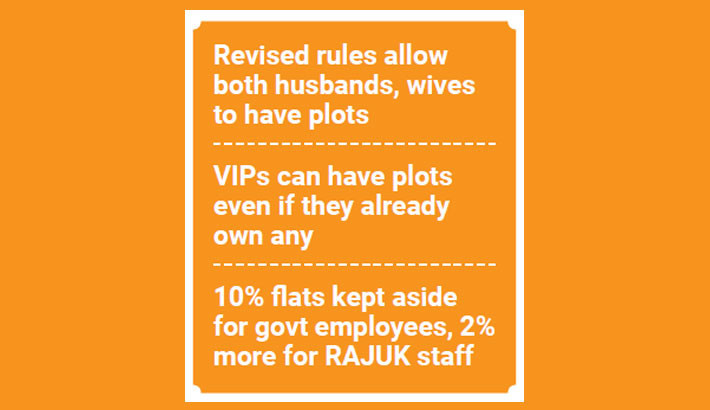
The Ministry of Housing and Public Works has come under fire for revising land and flat allotment rules, favouring the political elite and state officials, with experts calling the revoking the revision to ensure housing for all.
The revised rules allow both husbands and wives to receive plots in residential projects of the Rajdhani Unnayan Kartripakkha (RAJUK).
A quota of plots and flats for government employees, especially for those of the ministry and other departments under it, including RAJUK, has also been kept aside in the new rules.
According to the revised rules, 18% flats and 16% plots will remain reserved for such employees.
There is also a provision of reserved plots for ministers, members of parliament, freedom fighters and their immediate family members and people who have contributed to the country even if they have plots and flats in Dhaka and its suburbs. Experts said the revision was done to benefit an elite group with political motives which created great discrimination among citizens.
They called for immediate revision of the discriminatory sections of the rules and ensuring housing for all sections of people.
According to the RAJUK, the first rules for land allotment were framed in 1969.
According to the Allotment of Land Rules 1969, no person, who has already been allotted a plot for residential purposes, in his/her name or in the name of his/her, wife/husband or in the name of dependent children or any other dependent, by the Trust or the Government in any Housing Estate or by the Board of Revenue of any khas land or any person who has already a house within the jurisdiction of Dhaka and Narayanganj Municipal Committee or suburb of these Municipal areas within the jurisdiction of the Trust, shall be allotted a plot.
“In the rules, there was no provision for any quota for any group and the spirit was to ensure a minimum dwelling place or housing rights for people,” said a top RAJUK official, wishing anonymity.
Later in 1986, the Ershad government added a section which is called the infamous 13(A). The section stipulates: “Notwithstanding anything contained in this Chapter but subject to the provisions of Rule 9 thereof, the Trust (now RAJUK) may allot plots to persons who have rendered remarkable contributions in Government service, public service and in such other field of national importance as the Government may determine from time to time.”
The section allowed the subsequent governments to serve the elite class on political consideration, raising questions about the distribution of plots.
On 23 April 2024, the government issued a gazette notification making big changes to the rules and renaming it as Land, Plot, Space and Flat Distribution Allotment Rules.
The fallen Hasina-led government made a change in section 9 which earlier allowed either husband or wife to get the allotment of a plot but section 4(9) of the new rules allows both of them to have separate plots.
Besides, section 7 says the government can reserve a quota for different government and non-government professionals, people who have contributions to the country and VIPs.
On top of that, the government can reserve a 2% quota of plots for employees of the Ministry of Housing and Public Works, 2% quota for employees of other departments under the ministry and 2% for the RAJUK employees exclusively.
Besides, section 21 of the new rules stipulates that the government can keep aside 10% flats for its employees, 3% under the jurisdiction of the housing and public works secretary, 3% under the jurisdiction of the RAJUK chairman and 2% for the RAJUK employees.
The RAJUK official said, “Many bureaucrats and their wives, including former Housing and Public Works Minister RAM Obaidul Muktadir Chowdhury, had earlier submitted applications for plots but due to original rule 9, their purpose could not be served. Later, the entire rules were changed to allow them to have separate plots. But if we allot two plots in a family, our purpose of housing for all will be hindered.”
He said a vested group, which applied earlier for plots and flats, was trying to get multiple plots and flats in a family using the rules.
Talking to the Daily Sun, President of Bangladesh Institute of Planners Adil Mohammed Khan termed the rules discriminatory and ill-motivated. “The rules were framed in 1969 with a spirit of ensuring housing for citizens. But later, the provision of some quotas was inserted and a kind of discrimination was created.”
“The revision of the rules has now been made to serve the interest of a few people. A new provision of allotting plots for husbands and wives has been incorporated to benefit very few people at the policy-making level. For one’s interest, the whole rules have been changed, which is a clear discrimination to common people,” he said.
Adil said, “The Housing and Public Works Ministry is a state institution like many others. Why is it reserving quotas for itself and its subordinate offices instead of the section of the population that lags? There’s no room for it. With the fall of the autocratic government, we can now think about changing it.”
The government should also consider cancelling facilities for ministers, members of parliament and other political elites to import duty-free cars.
When asked about the inclusion of discriminatory sections in revised rules for plot allotment, Housing and Public Works Secretary Hamidur Rahman Khan said they were considering removing the sections.
“We’ve already formed a committee to identify the discriminatory sections in the new rules. After getting a report from the committee, we can say what changes will be made,” he told the Daily Sun.

